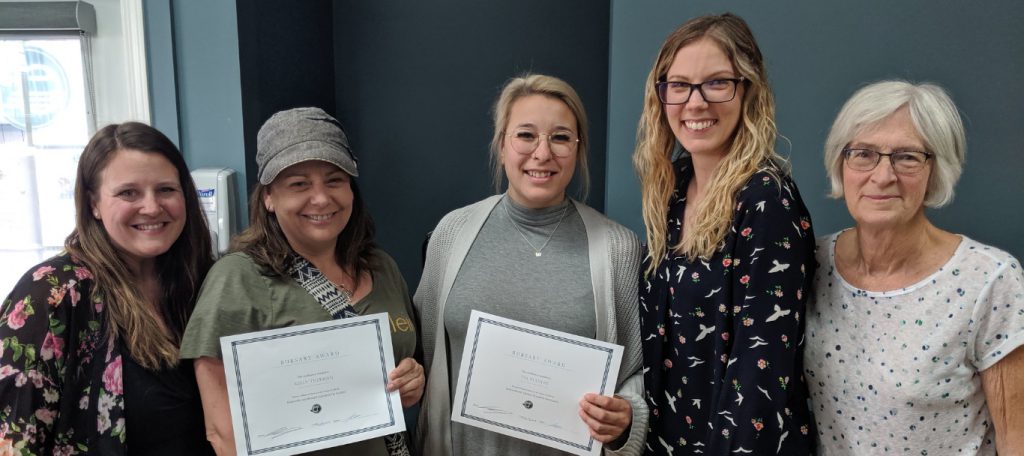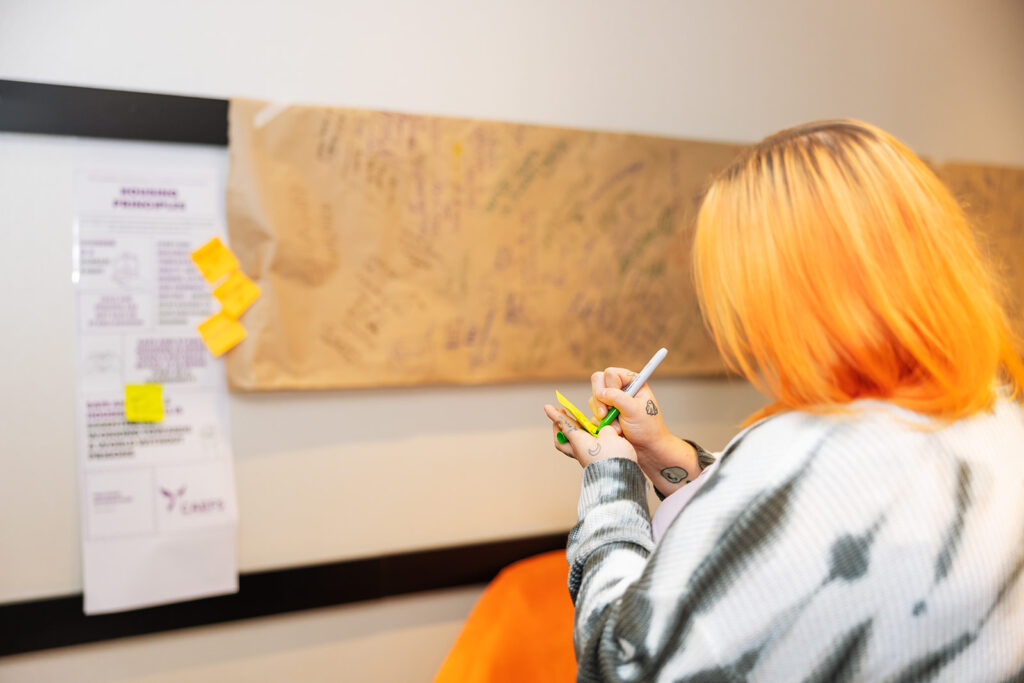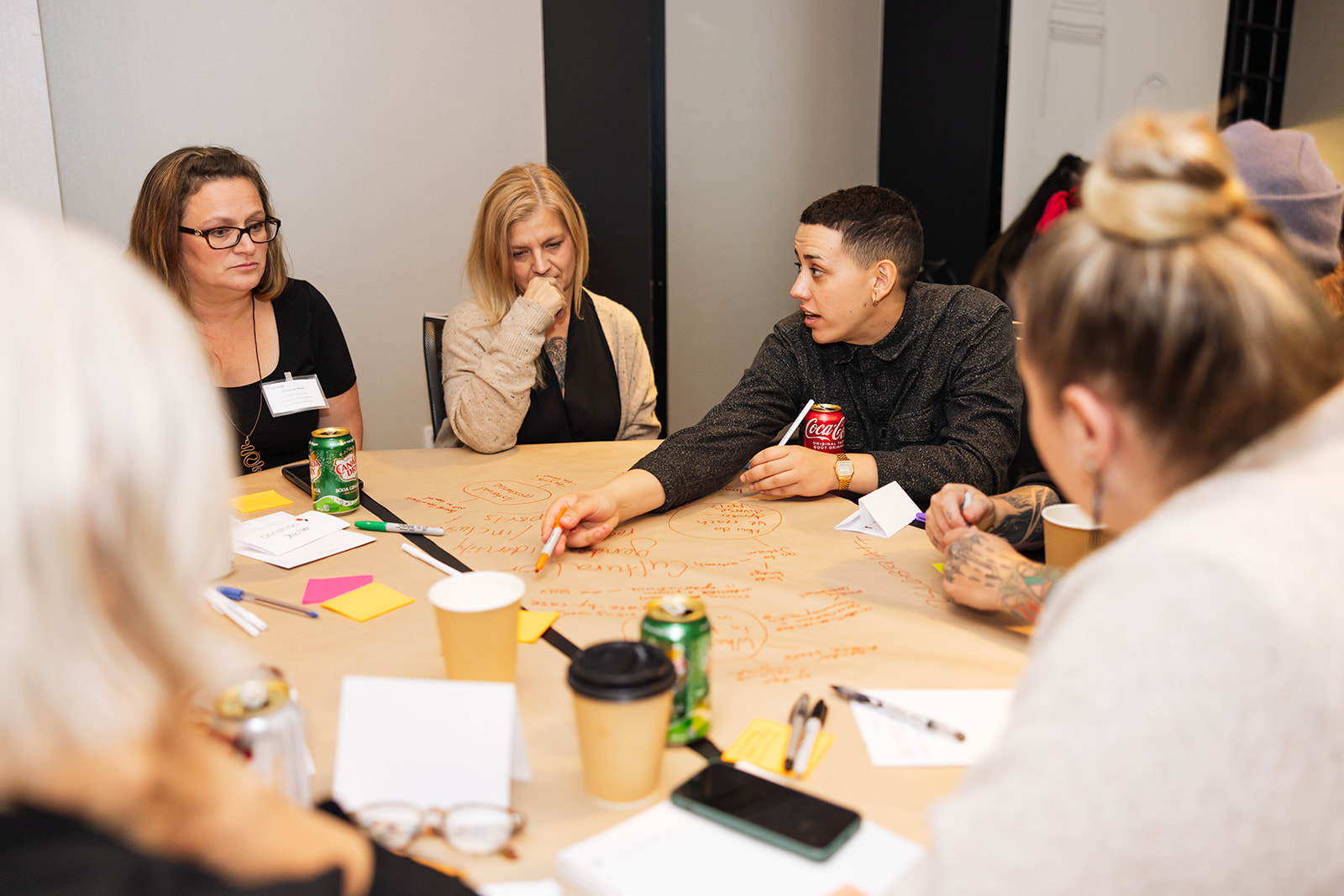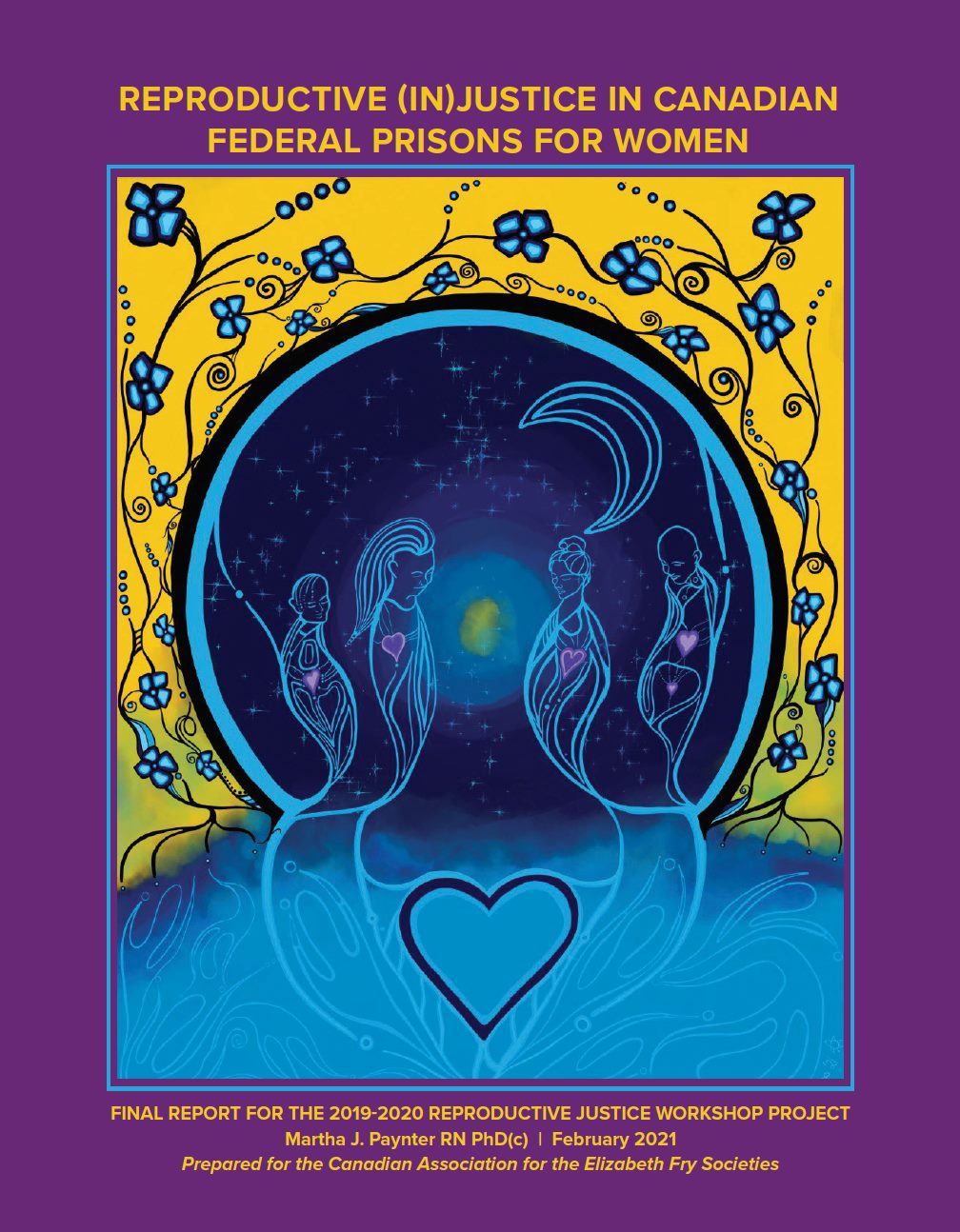-
Accessibility
Accessibility
- Français
Learn more about some of CAEFS recent and ongoing projects and initiatives.
The Centre for Research into the Processes, Outcomes, and Impacts of Incarceration (CRPOI) brings together a national interdisciplinary and cross-sectoral network of researchers, non governmental advocacy organizations, and experts with lived experience of incarceration into a connected research community to increase evidence about the impacts of incarceration in Canada on individuals, families, communities, and on society.
This project is a collaboration between CAEFS and the Elizabeth Fry Society of Mainland Nova Scotia with the goal of decreasing barriers to access to justice for criminalized populations by identifying, strengthening, connecting, and scaling the capacity of existing legal advocacy efforts and knowledges, through a framework that centers the voices of lived experience and informal and grassroots approaches / expertise.
The P.A.T.H Project objectives are:
In 2021, CAEFS created the position of Northern Regional Coordinator for the Yukon Territory, Northwest Territories, and Nunavut in response to an identified need. With no membership societies in any of the three territories, CAEFS felt it was important to develop connections with First Nation, Metis, and Inuit governments and communities, Indigenous organizations, and non-profit organizations currently supporting criminalized women and gender-diverse people from the northern territories. CAEFS’ work in
the territories is driven by a desire to support the rights of Indigenous governments and communities to self-determination and support community-based initiatives.
CAEFS’ Northern Regional Coordinator has met and collaborated with numerous governments and organizations located in the Yukon and Northwest Territories, such as the Council of Yukon First Nations, Yukon First Nation governments, Northwest Territories Indigenous governments, Yukon Corrections, federal parole officers in both Yukon and Northwest Territories, the Minister and Deputy Minister of Justice for Northwest Territories, transition home operators in both territories, non-profits, and criminal defense lawyers representing justice-involved people in the territorial and federal prisons. Breaking The Cycle surveys were provided to potential external service providers to learn about the current supports being offered to criminalized folks in the Yukon and Northwest Territories. The data collected from these surveys helped inform CAEFS’ conversations with local service providers as well as determine the community need and interest in establishing local Elizabeth Fry membership societies. All programming administered by future membership societies in the territories will be co-created and co-developed by Indigenous governments and organizations to ensure cultural safety
CAEFS is currently working on several projects with local organizations from the Yukon Territory. COVID-19 has made in-person trust building challenging, however CAEFS hopes that 2022 will allow for safe community visits.
CAEFS has partnered with the Yukon Status of Women’s Council (YSWC) on a case study to explore the community parole options for federally sentenced Indigenous women and gender-diverse people in the Yukon. This project is being funded by the Canadian Court Challenges Program. The case study examines whether the disparity in services available to men exiting prison compared to those available to women is genderbased discrimination under section 15 of the Canadian Charter of Rights and Freedoms. CAEFS and YSWC will be releasing their case study in conjunction with a legal memo prepared by Yukon lawyer, Vincent Larochelle.
CAEFS is also working to unpack the community safety issues surrounding Yukon’s Safer Communities and Neighbourhoods Act (SCAN). This Act allows for community members to report alleged suspicious activities, such as sex work, drug trafficking, and bootlegging to SCAN authorities. SCAN officers can investigate and handle complaints about the alleged activity outside of the criminal justice system. Section 3(2) of the Act allows for complaints to be resolved via landlords terminating a lease or tenancy with only five days’ notice, regardless of tenancy agreements. While SCAN disproportionately impacts marginalized people, it is liked by some communities in the territory. Through this project CAEFS will meet with these communities to learn how SCAN impacts them and how our organization can support alternative community safety practices.
CAEFS currently submitted a number of funding applications in with Pauktuutit Inuit Women of Canada, EFry Northern Alberta, and Liard Aboriginal Women’s Society to support ongoing work in the northern territories.
This research project, “Honouring Voices and Visions: Illuminating Incarcerated Indigenous Women and Gender-diverse peoples Sexual, Reproductive and Maternal-Child Health and Wellness” aims to understand and address the Over-incarceration of Indigenous women and gender-diverse people and current health and wellness realities. This collaborative research will be undertaken through interdisciplinary and multisectoral teams with Indigenous and allied researchers, Knowledge Keepers, healthcare providers, academic institutions (University of Calgary, McMaster University, Lakehead University, University of Manitoba, Simon Fraser University, University of Saskatchewan, Dalhousie University); and national advocacy organizations including Native Women’s Association of Canada and CAEFS. Correctional Service of Canada (CSC) will also be consulted for data collection purposes.

CAEFS Memorial Bursaries are annual bursaries that support women and gender-diverse people who are or have been incarcerated in reaching their educational and employment goals. Each bursary is $750 and the number of bursaries distributed is based on the availability of funds. Past bursary recipients have used bursary to fund entrepreneurial projects, buy school supplies, or subsidize the cost of post-secondary courses, and more.
Applications are evaluated based on whether there is a clearly stated goal and a plan to achieve that goal. It will also take into consideration if the applicant has faced or is facing barriers in achieving their goal that this bursary might help to overcome. We encourage applicants to list other ways that CAEFS or a local Elizabeth Fry Society might help you in achieving their goal, but those questions will not be used to evaluate the application.
Applications for 2023 are now open! Find out more information and access the application here!
Launched in late 2019, Breaking the Cycle (BTC) is a four-year project rooted in ending the cycles of incarceration for women, trans, non-binary, and Two-Spirit people in Canada. This initiative centers on
ensuring that vulnerable and criminalized women and gender-diverse people can access the supports they need. A critical part of this work is collaborating with our local member societies to develop and strengthen the resources that criminalized women and gender diverse people need.
This project is funded through a capacity building grant from Women and Gender Equality Canada
(formerly the Status of Women Canada) and has enabled much of our capacity building work, both
internally and externally to our network – including an update of our “Human Rights in Action” handbook and the forthcoming “Community in Action” handbook.


The Government of Canada officially recognized housing as a human right in 2019. According to international human rights law, the right to housing is understood as the right to a safe and adequate housing in which one can live in security, peace and dignity.
Yet, criminalized women and gender-diverse people face multiple systemic barriers to accessing and retaining safe and affordable housing—before, instead of, and after incarceration. Housing is a key issue in protecting the rights of criminalized women and gender-diverse people as well as an important support for fostering safe transitions back into communities after incarceration.
In late 2021, the CAEFS hired a team to work to advance ongoing housing and residential research and strategy development work for our membership.
This project was funded through the Canadian Women’s Foundation’s Safer + Stronger Grants and the Northpine Foundation. The recognition of housing as a human right by the Government of Canada has created new funding, advocacy, and capacity-building opportunities. CAEFS continues to work to center the experiences of criminalized women and gender-diverse people and support their position as rights-holder within these emerging funding, legislative, and accountability frameworks.
Using a trauma-informed, intersectional, and gender-based lens, the team conducted research into the bi-directional relationship between housing insecurity and criminalization. This work recognizes how housing needs disproportionately and uniquely impact women, Indigenous peoples, 2SLGBTQIA+, and/or racialized groups. The team also conducted an extensive literature review to better understand the complex nature of the interconnections between barriers to accessing and retaining safe and adequate housing and involvement with the criminal justice system.
The team also worked directly with CAEFS’ membership to collaboratively create resources, and advocacy tools. As a first step to robust strategy building, the team developed the “CAEFS Housing and Residential Portrait.” The report found that CAEFS members are growing rapidly as housing and housing related service providers, with important geographic variation. Some members have successfully adopted and adapted emerging development practices and models such as modular building, hotel conversions, and community land trusts. The Portrait highlights several policy areas for further investigation including Indigenous housing needs, avoiding displacement of “hard to house” individuals, trans and gender-diverse inclusion, and orienting housing and residential options towards the mission of abolition.
The housing team assisted member societies seeking housing-related advice and information. The team wrote a briefing document about the underfunding of Community Residential Facilities and request for alternative funding models as part of a network-wide presentation to Correctional Services of Canada. The team is also assisting a member society to challenge a land-use zoning restriction on a potential new residential facility. They developed knowledge sharing platforms, knowledge exchange workshops, and databases that will facilitate the sharing of best practices, development strategies, and funding applications across the network.
The team also developed network engagements and engagements with people with lived experience of incarceration with the goal of building further capacity through knowledge sharing and collaboration opportunities. This culminated in a network-wide in-person “Housing Summit” in Montreal, Quebec in September 2022.
A final report is forthcoming in 2023.
In late 2019 and early 2020 CAEFS hosted a series of Reproductive Justice workshops to people incarcerated in 5 of the 6 federal prisons designated for women, led by Martha Paynter. Workshops were delivered with the collaboration of Indigenous Elders and with the support of CAEFS’ regional advocates.
Following the workshops, Martha Paynter wrote a report which describes how federal incarceration impedes reproductive justice by restricting access to health services and by destroying family connections. The report also includes recommendations for advocacy for the Canadian Association of Elizabeth Fry Societies to advance reproductive health and justice. Learn more about these workshops and read the report below.

To mark Sexual and Reproductive Health Awareness Day 2021, we hosted a conversation between Emilie Coyle, Martha Paynter, and Toni Sinclair that dives deeper into the “Reproductive (In)Justice” report.
They discuss the experience of developing and delivering the workshops that informed the report, what we learned, and what we are going to do next. Trigger Warning This discussion includes mention of sexual assault, coerced sterilization, familial separation, and other forms of reproduction oppression and injustice.
Emilie, Martha, and Toni also discuss important case law (like R v Ewanchuk – aka the ‘no means no’ case) and legal protections (like the Bangkok rules).